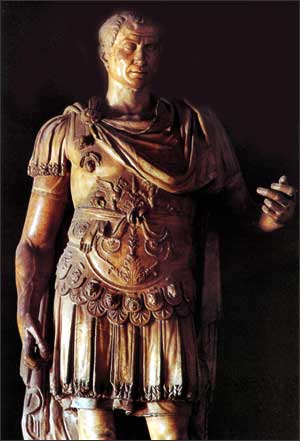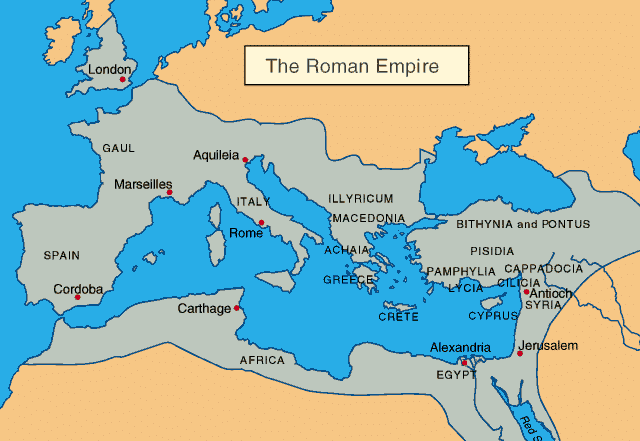Cleopatra, queen of Egypt and lover of Julius Caesar and Mark Antony, takes her life following the defeat of her forces against Octavian, the future first emperor of Rome.

Rome, the greatest power in the Western world, was also beset by civil war at the time. Just as Cleopatra was preparing to attack her brother with a large Arab army, the Roman civil war spilled into Egypt. Pompey the Great, defeated by Julius Caesar in Greece, fled to Egypt seeking solace but was immediately murdered by agents of Ptolemy XIII. Caesar arrived in Alexandria soon after and, finding his enemy dead, decided to restore order in Egypt.

In 47 B.C., Ptolemy XIII was killed after a defeat against Caesar’s forces, and Cleopatra was made dual ruler with another brother, Ptolemy XIV. Julius and Cleopatra spent several amorous weeks together, and then Caesar departed for Asia Minor, where he declared “Veni, vidi, vici” (I came, I saw, I conquered), after putting down a rebellion. In June 47 B.C., Cleopatra bore a son, whom she claimed was Caesar’s and named Caesarion, meaning “little Caesar.”
Upon Caesar’s triumphant return to Rome, Cleopatra and Caesarion joined him there. Under the auspices of negotiating a treaty with Rome, Cleopatra lived discretely in a villa that Caesar owned outside the capital. After Caesar was assassinated in March 44 B.C., she returned to Egypt. Soon after, Ptolemy XIV died, likely poisoned by Cleopatra, and the queen made her son co-ruler with her as Ptolemy XV Caesar.
With Julius Caesar’s murder, Rome again fell into civil war, which was temporarily resolved in 43 B.C. with the formation of the second triumvirate, made up of Octavian, Caesar’s great-nephew and chosen heir; Mark Antony, a powerful general; and Lepidus, a Roman statesman. Antony took up the administration of the eastern provinces of the Roman Empire, and he summoned Cleopatra to Tarsus, in Asia Minor, to answer charges that she had aided his enemies.
Cleopatra sought to seduce Antony, as she had Caesar before him, and in 41 B.C. arrived in Tarsus on a magnificent river barge, dressed as Venus, the Roman god of love. Successful in her efforts, Antony returned with her to Alexandria, where they spent the winter in debauchery. In 40 B.C., Antony returned to Rome and married Octavian’s sister Octavia in an effort to mend his strained alliance with Octavian. The triumvirate, however, continued to deteriorate. In 37 B.C., Antony separated from Octavia and traveled east, arranging for Cleopatra to join him in Syria.
In their time apart, Cleopatra had borne him twins, a son and a daughter. According to Octavian’s propagandists, the lovers were then married, which violated the Roman law restricting Romans from marrying foreigners.
Antony’s disastrous military campaign against Parthia in 36 B.C. further reduced his prestige, but in 34 B.C. he was more successful against Armenia. To celebrate the victory, he staged a triumphal procession through the streets of Alexandria, in which he and Cleopatra sat on golden thrones, and Caesarion and their children were given imposing royal titles. Many in Rome, spurred on by Octavian, interpreted the spectacle as a sign that Antony intended to deliver the Roman Empire into alien hands.
After several more years of tension and propaganda attacks, Octavian declared war against Cleopatra, and therefore Antony, in 31 B.C. Enemies of Octavian rallied to Antony’s side, but Octavian’s brilliant military commanders gained early successes against his forces. On September 2, 31 B.C., their fleets clashed at Actium in Greece. After heavy fighting, Cleopatra broke from the engagement and set course for Egypt with 60 of her ships. Antony then broke through the enemy line and followed her. The disheartened fleet that remained surrendered to Octavian. One week later, Antony’s land forces surrendered.
Although they had suffered a decisive defeat, it was nearly a year before Octavian reached Alexandria and again defeated Antony. In the aftermath of the battle, Cleopatra took refuge in the mausoleum she had commissioned for herself. Antony, informed that Cleopatra was dead, stabbed himself with his sword. Before he died, another messenger arrived, saying Cleopatra still lived. Antony had himself carried to Cleopatra’s retreat, where he died after bidding her to make her peace with Octavian. When the triumphant Roman arrived, she attempted to seduce him, but he resisted her charms. Rather than fall under Octavian’s domination, Cleopatra committed suicide on August 30, 30 B.C., possibly by means of an asp, a poisonous Egyptian serpent and symbol of divine royalty.
Octavian then executed her son Caesarion, annexed Egypt into the Roman Empire, and used Cleopatra’s treasure to pay off his veterans. In 27 B.C., Octavian became Augustus, the first and arguably most successful of all Roman emperors. He ruled a peaceful, prosperous, and expanding Roman Empire until his death in 14 A.D. at the age of 75.


